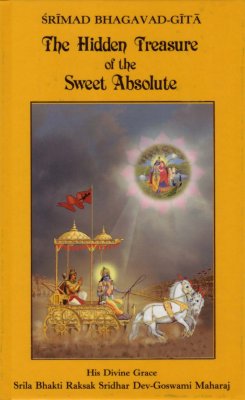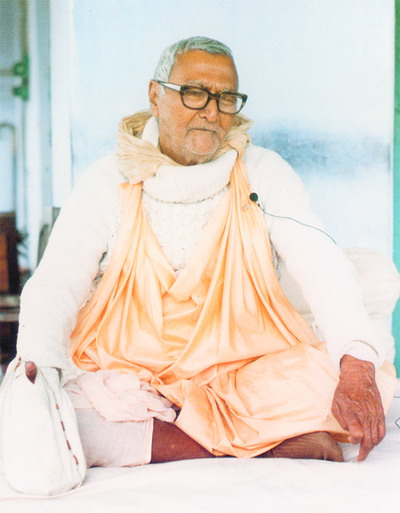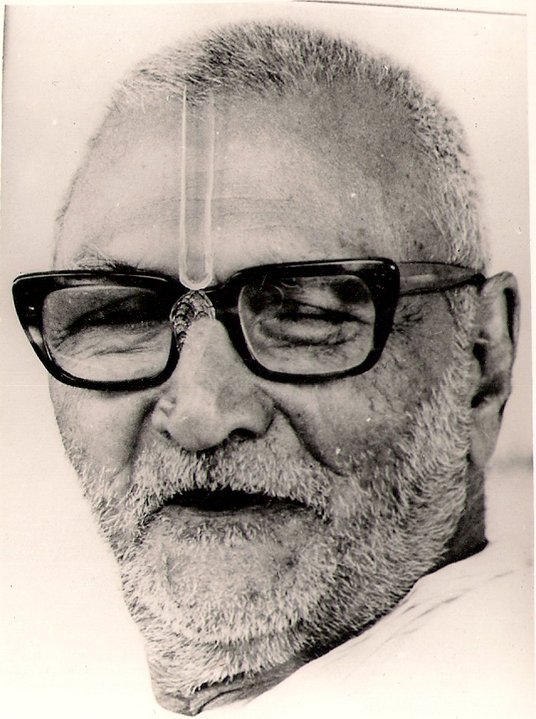Sushen Krishna Das
by
By
http://groups.google.co.in/group/Online_Sadhu_Sanga/web/the-subjective-bhagavad-gita-part---iii
Finally, we come to the last of the four nutshell verses Bhagavad-gita 10.11:
tesam evanukampartham
aham ajnana-jam tamah
nasayamy atma-bhavastho
jnana-dipena bhasvata
Krishna says: “To show them special mercy, I enter their hearts and destroy their ignorance with the lamp of knowledge.”
The inner meaning of this verse is more difficult to draw out. The words tesam evanukampartham may be interpreted in two ways. The external interpretation is that Krishna favors His devotees, and the internal explanation is that Krishna is saying, “I want their favor: I aspire after the favor of the devotees of the highest order.” As in Bhagavatam (10.82.44), Krishna says:
mayi bhaktir hi bhutanam
amrtatvaya kalpate
distya yad asin mat-sneho
bhavatinam mad-apanah
“My dear gopis, everyone considers themselves fortunate if they possess devotion for Me, and by that they achieve an eternal life of nectar. But I must admit that I consider Myself most fortunate because I have come in touch with the wonderful affection found in your hearts.”
Still the paradox is that Krishna seems to say that after such grief and continued engagement with Krishna, then He gives these higher devotees pure knowledge, and by that knowledge they get salvation by attaining Brahman. That is the point of argument made by the followers of Sankaracharya. But I have taken it in another direction.
Jnana-dipena is a troublesome expression – “I enlighten them with knowledge” – so I have given another interpretation: When the pangs of separation felt by Krishna’s devotees comes to its extreme stage, Krishna suddenly comes and shows Himself. For example, Sacidevi feels extreme separation when she cooks for Nimai, and then by His mercy she can see clearly that Nimai has come and taken prasadam. Similarly in Vrindavana, when the pangs of separation reach their highest degree, then suddenly the devotees can see that “Krishna is here in our company.” So when Krishna says that out of His mercy He appears and removes their ignorance, their ajnana, he means that when the devotees are experiencing separation from Him, He appears before them and removes the darkness they feel from separation. Out of His mercy, He gives them sustenance. And when that sort of medicine has been applied, they can go on further. In Vrindavana, when His devotees felt separation, sometimes He had to come and to show His friends, “I am amongst you. I have not left you.” This is what is meant by dispelling darkness with the light of divine knowledge: jnana-dipena bhasvata. Here the word ignorance or ajnana means jnana-sunya-bhakti, knowledge-free devotion. Devotees do not think that they are part and parcel of the lila, the pastimes of the Supreme God. No; their devotion is free from such calculation. It is jnana-sunya-bhakti: most innocent.
Here Krishna is saying, “I can’t tolerate the pangs of separation felt by My devotees. I must run towards them and show them, ‘I am here, My mother. You see? I am here taking food.’” Sometimes Sacidevi prepares food for the Deity, and after offering it, she sees that it is all gone. At that time, she thinks, “Was this a dream? I saw Nimai. He was taking prasada, and of course nothing was left in the pot. But Nimai has gone long ago. But then who has taken this prasada? What was it I saw? Was it a dream, or has some dog taken the food? Or is it that I forgot, I have not cooked today? Perhaps I did not give the bhoga to the Bala Gopala deity. What did I do?”
In this way, Saci is confused. This may be seen as her ajnana, her “ignorance.” Then Sri Chaitanya sends some devotee to her, saying, “You tell all this to my mother: on those days when such things occur I actually go there; I take food from her hand. It is not a dream. Remind My mother of this and console her. Tell her that I come to her and I take her cooked prasadam. Remind her that this has occurred.”
So this is the meaning of the fourth nutshell verse from Bhagavad-gita: by His mercy Krishna removes the darkness of separation from His devotees. And those that remind us of Krishna, and thus remove the darkness born of separation from Him, are the real humanitarians. They are distributing the highest cure. The gopis tell Krishna: “We are suffering from this pang that is created by You. But the messages about Your pastimes give us life and sustenance. We are eager to hear this, and then we may feel that we are getting our life back. There is no other medicine but Your assurance and consolation: that alone can save us from these pangs of the burning heart.” This is their statement in Srimad-Bhagavatam (10.31.9):
tava kathamrtam tapta-jivanam
kavibhir iditam kalmasapaham
sravana-mangalam srimad-atatam
bhuvi grnanti ye bhurida janah
“O Krishna, we are always suffering in this world, but just hearing the nectar of Your words and pastimes gives us life and as a by-product it removes all of our sinful reactions. This sort of hearing is all-auspicious and fills us with spiritual wealth. Those who deliver this message of Godhead are doing the highest relief work for human society and are actually the greatest humanitarians.”
These four nutshell verses from Bhagavad-gita which we posted with title The Subjective Bhagavad-Gita in three parts are known as catuh-sloki Bhagavad-gita. In future we will continue further our postings on:
 | Srimad Bhagavad-Gita:The Hidden Treasure of the Sweet Absolute
 Srila B. R. Sridhar Dev-Goswami Maharaja |
His Divine Grace
Srila Bhakti Raksak Sridhar Dev-Goswami Maharaja Ki Jay!!!
.


Haribolo
ResponderExcluir